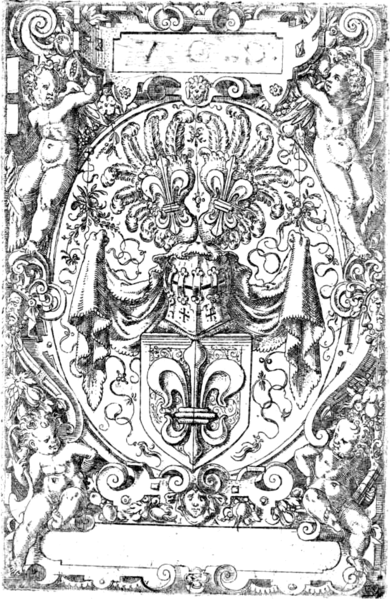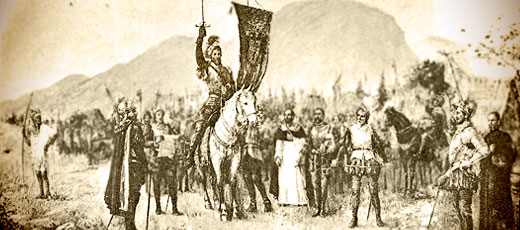The Welser family was an old family, claiming a family tree stretching back to the Byzantine Empire[1]. But more importantly it was a rich one, one of the richest in Europe at the time. It had gained this wealth through banking, and it was through this that the family became the most unlikely player in the colonization of the Americas. Bartholomeus V. Welser, like his forefathers, was a banker to the crowned heads of Europe, and he was apparently quite good at it. He was given titles and positions at court by Charles V and throughout this period he made generous loans to help finance the Hapsburg's overstretched Empire. This understandably meant that Charles V's budget was often in the red. To try and offset this mounting debt to the Welser's the Emperor offered the family a deal in 1533. In lieu of actually paying them money the Crown of Castile would grant the Welser family sole rights over the Province of Venezuela. Bartholomeus V. Welser accepted. The origins of the name Venezuela are disputed, some attributing it to the standard "native name is mangled by Europeans" while others say it reminded early explorers of Venice. Clearly the Welsers favored the latter, as they named their new land "Klein-Venedig", German for "Little Venice".
The first 13 years or so of Welser control consisted of some settlements and mining operations near the coast but mostly of expeditions into the interior. The search for El Dorado was a major pursuit in Klein-Venedig, with large expeditions being sent into the interior to find the city of gold. These glorified treasure hunts were universally cruel and exploitive to the native populations of the area, both to those looted and those forced to guide them. But none of them were bringing back the wealth one would expect from El Dorado, none of them even brought back a fraction of the wealth to be found in Mexico.
This problem must have been on the minds of Governor Philipp von Hutten and Bartholomeus VI. Welser as they emerged from the jungle in 1546, by no means empty handed but not as wealthy as they so desired. Welser was the son of the Welser who had gotten Klein-Venedig in the first place, and he certainly must have sought to cement a legacy for his family. This pressure further intensified when they arrived in the town of El Tocuyo. This was surprising to them as El Tocuyo had not actually existed when they had set out into the jungle. There they met Juan Pérez de Tolosa, who had been appointed by the Real Audiencia of Santo Domingo as Governor of Venezuela since no one seemed to be actually governing Klein-Venedig while its Governor was searching for gold. Tolosa had founded El Tocuyo with settlers from the main settlement at Coro, and was generally running the colony at this point. Tolosa enjoyed running the colony and attempted to arrest Hutten and Welser, in the ensuing scuffle Tolosa was seriously wounded and forced to allow safe passage back to Coro for the pair alongside his own painful return. Along the way Hutten and Tolosa tried to come to some sort of agreement that would prevent an incident between the Real Audiencia and the Welsers. Tolosa pointed out that he'd actually been running Klein-Venedig and that maybe he would be the best choice to remain governor. However Hutten and especially Welser were skeptical of the idea that the Real Audiencia could have any authority over an area that had been granted directly to the Welsers from the Spanish Crown. Hutten agreed to stay in Coro until a settlement could be reached about the issue. Letters were dispatched once Coro was reached. In the end Charles V would rule in favor of the money and order Hutten restored as full governor[2].
By 1546 even the backwater Klein-Venedig had heard the tales of a vast southern empire that had defied conquest. Sun worshipers that had turned back the Spanish with treachery. The Tales told that gold and silver flowed out of Cusco like rivers. To Hutten and Welser these tales must have seemed like El Dorado. Even more enticing were the rumors about its location. Hutten believed, erroneously, that Quito was relatively close to Bogota. Bogota was outside of the Welser's domain, but was reachable from Klein-Venedig. The trek had been completed by Nikolaus Federmann some years previously. Federmann was dead by now, rotted away in an Inquisition cell. But the prospect of reaching Quito was a lucrative one. This prospect was rooted in the belief that the portion of the Andes that needed to be crossed to get to Bogota from Klein-Venedig were the same mountains that needed to be climbed to reach Quito. Hutten and Welser assumed that once Bogota was reached it would be a fairly simple route to Quito. Anyone familiar with either Quito or Bogota could have told them that they were wrong, but no such person emerged.
When Hutten arrived in Coro he got the news that Belalcázar had fallen out with Mendoza. This presented an opportunity, rather then march deep into the unknown jungle a trek could be taken to a place that had a well known wealth along a route that, while ridden with peril, had been "proven" to be possible. Hutten saw it as a win-win for him, he could ransack if he could and if not he could trade. Welser, a man born into the world of banking, saw the opportunities presented by connecting a wealthy empire to his family's financial network. So they hastily made plans for an expedition to Quito via Bogota. Their morale was boosted in early 1547 when the word returned from Charles V and the Council of the Indies declaring that Hutten remained Governor. However Tolosa would remain in the colony and in an ironic twist of fate be appointed "Mayor of Coro", a position invented by Hutten to avoid anarchy[3] in the colony while he galavanted through the jungle.
It took over a year for Hutten and Welser to organize their full expedition. Not only did they have to organize the normal helpings of forced labor, guns and supplies but they also had to carry valuable goods in case trading ended up being more viable then pillaging.
So it wasn't until November of 1548 that Hutten and Wekser reentered the jungle, having waited until the end of the rainy season to begin. They carried with them high hopes of bringing riches back to Klein-Venedig.
These high hopes would quickly be tested.
Firstly it became apparent that the rainy season was not quite over yet, and their early weeks en route to Bogata were dogged by heavy rain that slowed their progress. Tropical diseases killed several Europeans as they shambled towards the mountains, cutting their reliable forces if a battle erupted. It was journey miserable through the jungle. Crossing the Andes towards Bogota was no better, a cold, wet, journey even in the drier months of the year. Once the exited the mountains the party found more jungle. A squabble with native tribes living in the foothills of the Andes left Hutten with some bad wounds, forcing Welser to push onto Bogota without him. The residents of Bogota were suspicious of these German newcomers, but nonetheless allowed Welser to stay and contributed when he sent back men to retrieve Hutten. When the full Welser party arrived they began to root around for guides towards Quito, applying their now standard methods of brutality towards the natives. Far more troublesome to the settlers in Bogota was how pushy these newcomers were. The Klein-Venedig party were acting awfully haughty and demanding much from the Bogota colonists. They had absolutely no authority, the Welser grant did not include Colombia. It also meant that Hutten operated on a different field then the rest of the Spanish Colonies, meaning that he was not treated with the respect that say, the Governor of Cuba, would be afforded if he found himself in Bogota.
It got to the point where the local authorities called Hutten and reprimanded him for his actions. This managed to avoid an outbreak of violence, but by August 1549 both Bogota and the expedition were ready for the expedition to leave. They were entering what was essentially unexplored territory for Europeans.
The second stage of the journey would be both easier and harder for the expedition. Easier because the weather became more agreeable then before, and the expedition suffered less in the way of disease and injury. Harder because they were now wondering around uncharted territory, slowing their pace overall. In general they wandered southwest, though in one embarrassing incident they unintentionally visited the same town three times. But the months wore on, and as the dry season began, peaked, and began to fade into the rainy season it became apparent that they had misjudged the distance from Bogota to Quito. The question turned from when they would arrive to if they would ever arrive. But they pressed on and found evidence that their goal was near.
The "savage" tribes they looted their way through became more and more experienced in the ways of war, and they were on the move. Once interpreters were found[4] the reason was found. The tribes had heard that the Empire to the South was weak, and they were preparing to take back what once had been their's. The Sapa Inka's had long labored to push the Tawantinsuyu's borders north, but those pushed aside were still fighting. As the Welser's found guides who confidently led them towards the Tawantinsuyu they received further confirmation that they were close. Their guides were not surprised by their horses, perhaps a little awed but not surprised. Translators said that the horse was the beast of Tawantinsuyu, exciting Welser and Hutten. They were close. But what they were approaching was not the Empire that they had heard of back in Coro.
•••••
1: Specifically a certain Thracian subordinate of Justinian…
2: IOTL this incident happened much the same except instead of traveling with them back to Coro Carvajal had them ambushed and killed. Charles V wasn't in deep enough with the Weslers to force a return of the property and Klein-Venedig was
de facto ended. Though their charter wouldn't be formally revoked until Philip II's reign.
3: Well, avoid the Real Audiencia using anarchy as an excuse to try and replace him.
4: kidnaped



